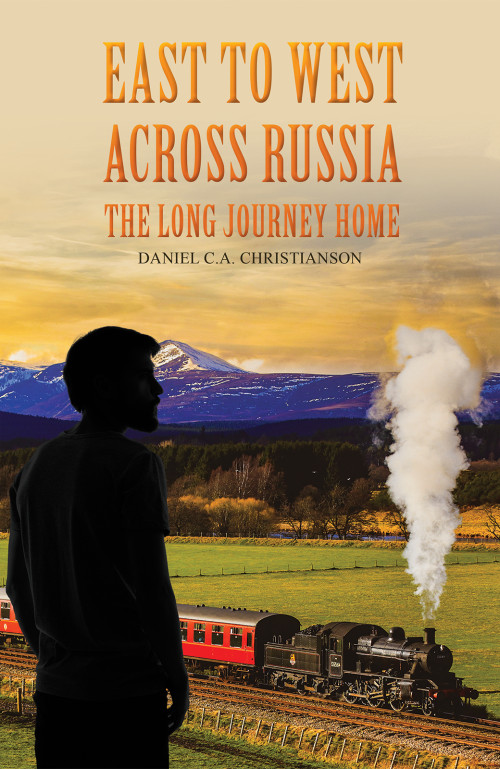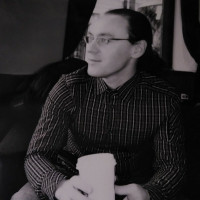
East to West across Russia: The Long Journey Home
Book Format: Choose an option
Free standard delivery on UK orders over £35
*Available directly from our distributors, click the Available On tab below

Book Format: Choose an option
Free standard delivery on UK orders over £35
*Available directly from our distributors, click the Available On tab below

He is a man of solitude. His world is that of the quiet and distilled. Each night, he sits at his desk as the clock strikes midnight. He journeys inward to that bottomless pit of conflict, prompted by memory, in search of an image fused with the imagination in order to reveal truth through character and the creative narrative process. The words become sentences and they are formed. And so it all begins. This was his first attempt and successful completion of a full-length book. His name is Daniel C.A. Christianson.
I am not really sure what to think about this book. There seems to be so many messages flowing through the narratives. At times the narrator through his protagonist D unleashes his venom and fury at the modern world whilst standing alongside the world's largest freshwater lake in the middle of siberia. There is nothing censored about the critique in a monologue that goes on and on until the protagonist eventually accepts his true fate in this world of pain and suffering. At times it feels that the narrator is speaking down upon the reader and castigating them for their silence and stagnancy especially with his judgement onto nationalism and war. He blames mankind for such destruction and evil perpetuated onto this world but he counts himself as very much human too and how he cannot fight such madness that he witnesses all around him. At the core of the novel is the journey of a lonely and broken man who longs for the great love of his life whom he refers to as N to return to his life but at journey's end there is a finality of acceptance for D. His old life has been written but now he must write his new chapter that stretches out in front of him upon an open road of love and hope.
I was told about this book back home in Germany last year. I had figured with Russia in the title that it was going to be a book filled with propaganda or heavily influenced with conflict and war. The very opposite was the case. It is a delightful memoir written by a love struck, lonely and deeply introspective man who we only know as D who crosses Russia slowly while pining for his lost love N. I cannot figure out if this mysterious woman named N is a real life person or simply a hallucinatory and distorted memory that D cannot let go o from his life. N plagues D wherever he goes in Russia and especially so along the distilled waters of lake baikal. He longs for her return and whilst she does make an appearance in the final scene I tend to believe like others have postulated that such a vision of N by D only resides within his own melancholic and imaginary thoughts and that N simply represents an ideal that we all long for but few of us can ever reach. I would like to see this book in translation and especially so in my native German. I am very curious as to how it will read in the German dialect.
Oh what a beautiful and captivating book this is. I read this book whilst interrailing through Europe last summer and what I loved most about this memoir is how the author was able to transport me there into the vast and endless plains of siberia with the mesmerising silence and natural wonder that flowed from such tranquil places in our world. I was there standing and sitting alongside D as he was going through his existential crisis of melancholia when he was confronted with his past and his love for N. I pleaded with N to return to the arms of D and although she does make a brief appearance in Moscow within the final scene there is no happy and romantic ending for D and N. N fades away into the ether just like how she faded away from the heart of D. There is no happy ending to this novel. It is one of pain and loss but also there is so much hope in this story in how the author through his protagonist urges the reader to stop what they are doing in this life and to examine how one lives and if we are happy with such a life. Felicitations Mr. Christianson. C'est vraiment merveilleux.
Oh Daniel, what a beautiful book you wrote. Your words were so thought provoking and meaningful. I only finished reading it this weekend and it is still fresh in my mind. Bea and I have not seen you in many years but we never forgot you and the impact you made on all our lives. We only ever saw you as our teacher and friend so when we came across your book and words we were shocked that you are a writer. We really should not be shocked as I feel that you wee born to be a writer in this world Daniel. The impact you made on our lives as an English language Teacher is obvious but now your impact will go much further as an artist. I was with you all along your journey crossing Russia. I laughed with you when you showed us the funny moments but I also cried with you when you were struggling and at your lowest emotionally. We just want to let you know Daniel that you will never be alone and that Catalunya and Barcelona will always be your home. We will cherish these words of yours and now we look forward to your next book whenever that will be.
My warmest congratulations to you Daniel on this the publication of your first book. I have not seen you in many years but I always remembered how passionate you were about writing and how your eyes would light up and your face would glow whenever talks of Russia would come up and in particular its many writers in whom you loved so much. One memory I have of you is how you would talk about the writer Franz Kafka. He was the one writer you urged me to read and in the many years since I have read Kafka's the Metamorphosis and the Trial. We are all so proud of you here and we want you to know that you will always have a home here in Catalunya where your beloved FC Barcelona continue to shine. Maria says hello and her review will follow. After reading your very special book I do have this strong urge to follow in your footsteps and cross Russia along the transsiberian railway. If I ever make that journey I will bring my copy of your book and read it again as I am crossing that land. Will there be a second book Mr Christianson? Love from Beatriz
I cried so much after reading this gem of a story by an author named Christianson whom I have never heard of before. There is so much pain and anguish flowing through the pages of this novel. The author stated in his preface that it was based on a non fictional story but with fictional narratives spread across this memoir. I lingered on that scene in which the protagonist remembers his father and he does so by depicting the last moments of his life as he lays gravely ill in a hospital bed. D calls out for a miracle but it never comes and his father Thomas succumbs to the illness that plagued his body and tarnished his once working lungs. Christianson is a humanist and in his novel he is championing the goodness and core of what makes us uniquely human. The author does not shy away from showing the depths and depravity of human kind but he also shows the inner core of who we all are and what love and goodness exists there. I cried at the end when N departs D for the final time. It was a natural but tragic cessation.
Oh what a beautiful and captivating book this is. I read this book whilst interrailing through Europe last summer and what I loved most about this memoir is how the author was able to transport me there into the vast and endless plains of Siberia with the mesmerising silence and natural wonder that flowed from such tranquil places in our world. I was there standing and sitting alongside D as he was going through his existential crisis of melancholia when he was confronted with his past and his love for N. I pleaded with N to return to the arms of D and although she does make a brief appearance in Moscow within the final scene there is no happy and romantic ending for D and N. N fades away into the ether just like how she faded away from the heart of D. There is no happy ending to this novel. It is one of pain and loss but also there is so much hope in this story in how the author through his protagonist urges the reader to stop what they are doing in this life and to examine how one lives and if we are happy with such a life. Felicitations Mr. Christianson. C'est vraiment merveilleux.
I was told about this book from a work colleague. He said that there was a passage devoted to Judaism and a critique on the Holocaust. In a world that is becoming ever more violent, ever more frightening and at times without an underlying message I fear that we are going to return to that time in the world when the Jewish people will be attacked once more just like they were during the great onslaught by the Nazis onto the Jews in the Second World War. Christianson in this very honest and sweet memoir is pleading with the world to change our ways and to find that elusive path towards peace before it is too late. I applaud the author for the research that he carried out on Judaism and the sensitivity and historical knowledge that was necessary in order to show the reader a little of what my people went through when they were attacked and almost erased by the Nazis on European soil. The world said never again but we continue to be attacked. We need books like East to West and messages of condemnation so that we can see the world as it truly is.
We use cookies on this site to enhance your user experience and for marketing purposes.
By clicking any link on this page you are giving your consent for us to set cookies